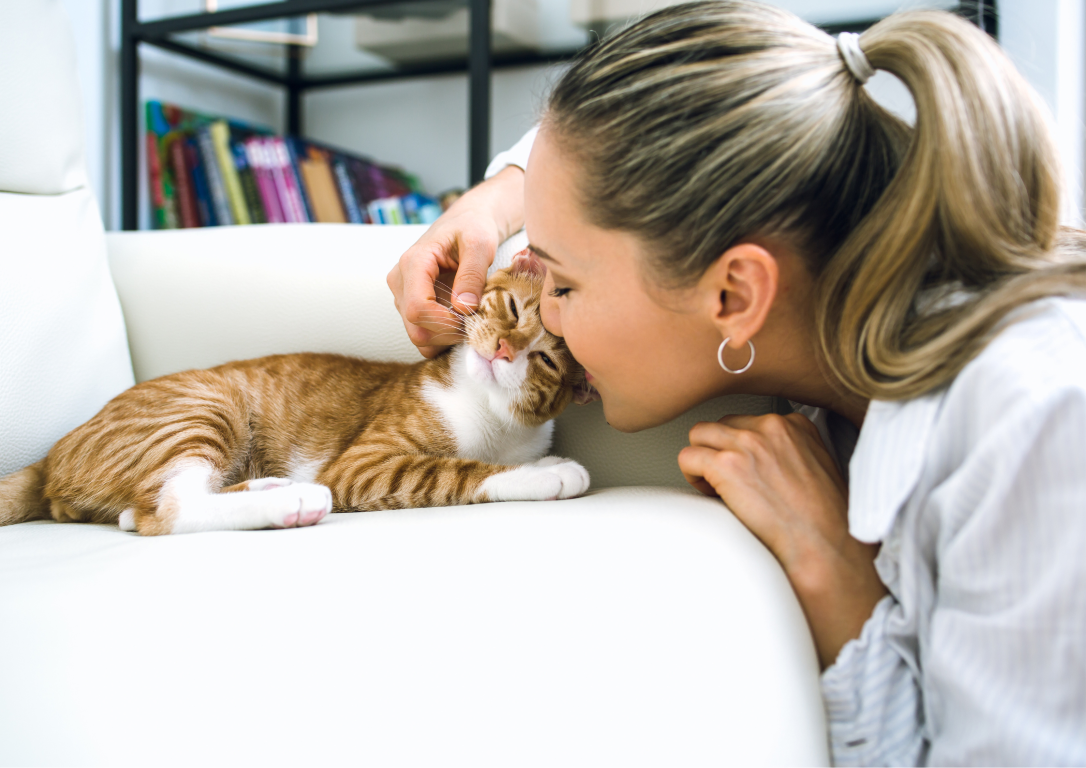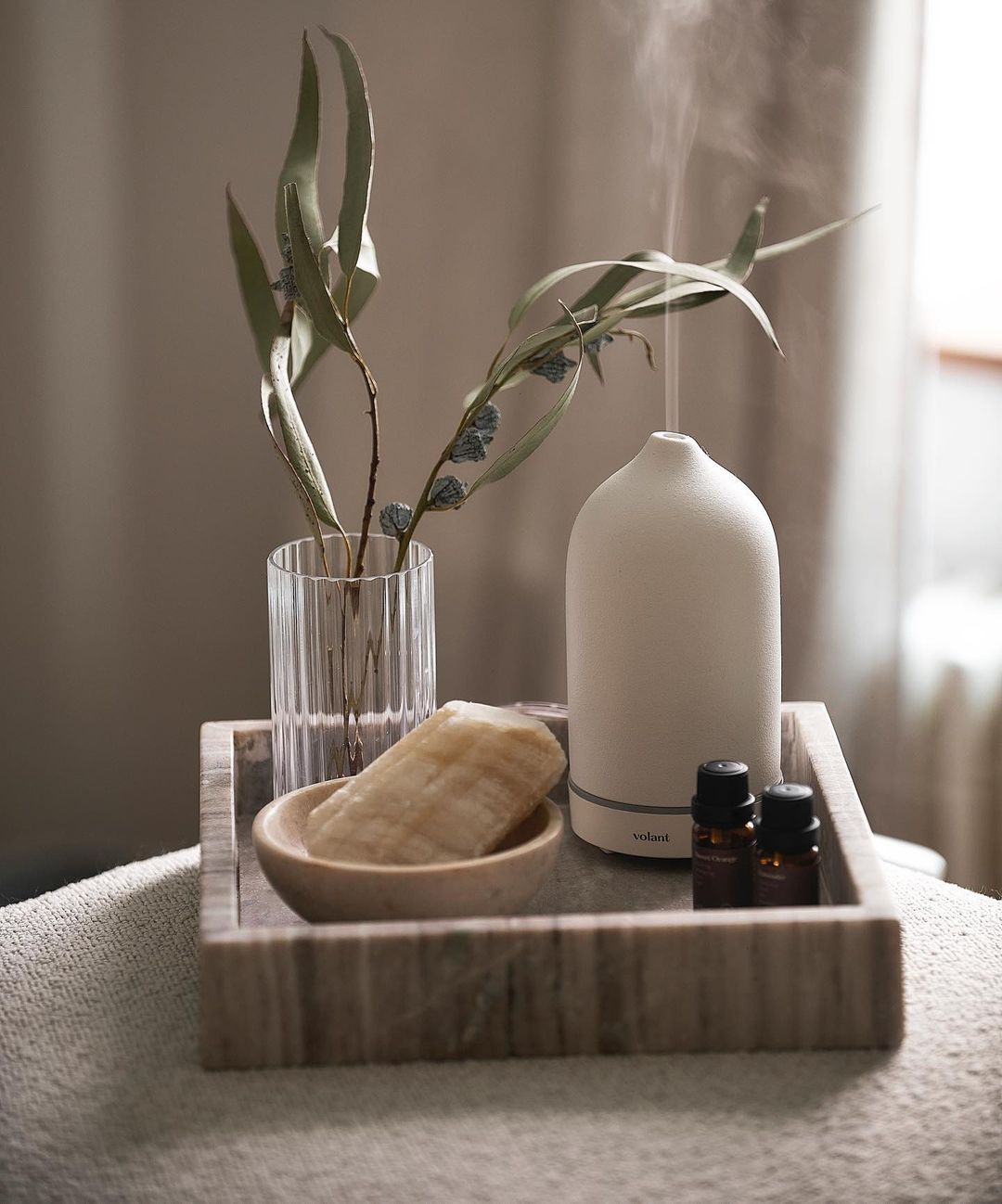Some pet owners have found great benefits to using essential oils for cat health, and some have even used pure essential oils to improve their cats’ quality of life. The best way to use essential oils for your cat is to refer to informed scientific opinions on which oils to use and how to use them. This will allow you to offer your feline companion all of the benefits of specific safe essential oils without exposing them to any potential harm.
Your experience with using essential oils for your cat may also vary depending on your cat’s size, weight, breed, age and general level of health. In this guide, we will detail the best essential oils safe for cats, the essential oils toxic to cats, calming essential oils for cats and research on the best use practices to ensure your feline enjoys the maximum benefits safely and effectively.
What are essential oils?

Essential oils are any oils extracted from plants and purified and concentrated for a variety of uses. All essential oils come from plants, but not all plant extracts and oils can be classified as essential oils. Pure essential oils, such as those offered by Volant, do not contain fatty acids but rather volatile organic compounds that are potent and therapeutic. They have a strong and distinct fragrance and are made with high quality plant materials using the best extraction methods without added chemicals.
Essential oils for cat use are those that have been found safe and effective by veterinary researchers. There are many essential oils toxic to cats in certain quantities, so it’s vital to only use those essential oils safe for cats to avoid any issues.
The best essential oils safe for cats

Disclaimer: Certain benefits of essential oils for cats have only been observed in a clinical environment. In many cases, the uses are still in their study phase and pet owners should not assume that these controlled results make them suitable as over the counter remedies. Always consult your veterinarian before using any essential oils near or on your pet.
The American Society for the Prevention of Cruelty to Animals (ASPCA) says that essential oils can be hazardous to pets, and especially cats, in their pure and undiluted form. However, if some of these oils are diluted at the correct concentrations and used cautiously, they are considered safe by most veterinary experts.
According to data from Veterinarians.org, which is based on the opinions and experiences of vets and their clients, the best essential oils for cats include cedarwood essential oil, rosemary essential oil, copaiba essential oil, helichrysum essential oil, and frankincense essential oil. Cats can also tolerate German chamomile and Roman chamomile oil, lavender essential oil, thyme essential oil and valerian essential oil at diluted concentrations.
Lavender seems to be the best researched essential oil for use with cats when diffused. Although scientific evidence supports its calming effect on cats when diffused, it can still be toxic if applied topically neat or undiluted to your cat’s skin or fur, as can any essential oil if undiluted.
Essential oils toxic to cats

There are many essential oils that are toxic to cats and are not suitable for them, according to Veterinarians.org. Some essential oils are more dangerous than others, and can potentially affect your cats even at small concentrations.
Some essential oils to avoid using for your cats and rather reserve for yourself include:
- 🐱 Bay essential oil
- 🐱 Birch essential oil
- 🐱 Cinnamon essential oil
- 🐱 Citronella essential oil
- 🐱 Clove essential oil
- 🐱 Eucalyptus essential oil
- 🐱 Fir essential oil
- 🐱 Geranium essential oil
- 🐱 Juniper essential oil
- 🐱 Pennyroyal essential oil
- 🐱 Pine essential oil
- 🐱 Tea tree essential oil
- 🐱 Wintergreen essential oil
- 🐱 Ylang ylang essential oil
- 🐱 All citrus essential oils, including bergamot, grapefruit, lemon, lime & orange
- 🐱 Any mint essential oils, including peppermint and spearmint
The leading oil on the list of essential oils bad for cats is tea tree oil, also known as melaleuca essential oil. This essential oil should never be used on or around cats as it can trigger intense adverse reactions that include ataxia (impaired balance or coordination), lethargy, salivation, tremors and comas.
Not only should you not use these oils on your cat, you should also not use it on yourself if you plan to be around your cat where your cat might get close to you and inhale it or lick you, thereby ingesting the oil accidentally.
Benefits of using essential oils for cats
The body of research available on the use of essential oils on pets, and especially on cats, is still relatively small. This means that while some benefits are suggested by studies, more research is needed before it is possible to definitively say that your cat will benefit from the use of essential oils in any specific way.
.
However, many cat owners have found essential oils to be a safe and effective way to improve the lives of their animals. Some of the benefits reported include:
Tick and flea repellent

Tick and flea medicine is widely available to keep these parasites off of your cats, but not every cat owner is comfortable with using these chemicals on their animals. Some cat owners have found that insect-repelling essential oils such as cedarwood and rosemary essential oils may work as a gentle tick and flea repellent.
Inflammation reduction

Many essential oils have anti-inflammatory properties that may help to address inflammatory conditions in cats. Thus, some oils may be appropriate for a cat that suffers from an inflammatory condition like arthritis, or for painful and inflamed areas like bruises and injuries. Frankincense essential oil is a powerful anti-inflammatory and can aid in reducing inflammation and pain when diluted.
Infection treatment

A few essential oils that are safe for cats also offer antimicrobial, antibacterial and antifungal properties which could assist in the treatment of infections. Some studies have found certain essential oils like rosemary and oregano to be effective at combating certain types of pathogens commonly associated with infections in pets. This was an in vitro study, so the effects of the oils were not tested directly on the animals.
Diffusing benefits

Diffusing cat-safe essential oils is commonly touted as the safest way to expose your felines to these oils. Some cat owners report that diffusing diluted concentrations of a calming oil like lavender can help to calm stress and anxiety in cats at home, in the car, at the vet or while recovering from an illness or injury, and research does support this method of use for lavender with cats. Other cat owners note that diffusing cedarwood essential oil can help to repel fleas and keep them outside.
How to use essential oils for cats
Why are some essential oils bad for cats?
According to CatHealth.com, cats lack certain liver enzymes that break down a variety of substances, which is why they are more sensitive to essential oils and common medications than humans are. For example, cats lack the enzyme glucuronyltransferase which breaks down phenols. Essential oils are rich in phenols (especially citrus oils) and highly concentrated, which makes it even more important to use essential oils for cats safely and carefully.
The renowned pet publication also notes that you should never use any essential oil directly on a cat, especially undiluted. If you are planning on using any products containing essential oil dilutions, ensure that it is indicated specifically for cats.
However, it’s important to note that essential oil-based products for pets are often not regulated, and even when used according to the label, adverse reactions can still occur. One report showed that in 77% of adverse reactions, the products were used according to the directions on the label. It also noted that adverse reactions were much more common in cats than in dogs.
Diluting essential oils for topical use for cats
While essential oils are usually diluted with a carrier oil for topical use on human skin, cats are mostly covered in fur. If you want to use an essential oil that is considered safe for cats on their skin in an area they can’t lick, you can dilute a single drop of essential oil in 50 drops of a gentle carrier oil like almond oil.
However, diluting an essential oil for use on cat fur generally involves mixing it with water. You can do this in the bath while bathing your cat or using a spray bottle to spritz your cat’s fur.
Diffusion is safest
As mentioned above, one of the safest ways to expose cats to essential oils is by using a diffuser with a diluted mixture of essential oil to water. However, even if you are using your diffuser to benefit your cats, you need to ensure you leave a door or window open so that they have the ability to leave the room if they feel uncomfortable.
Bear in mind that the droplets created by a diffuser contain essential oils, and can land on your cat’s fur and be ingested during self-grooming. When using your diffuser, use it for short periods of time to avoid having too many essential oil droplets settle on your cat.
You should also use your diffuser on a high surface which your cat can’t reach or won’t go. Remember, cats can jump high! Stow the cord away safely to prevent any spills, which may expose your cats to more of your chosen essential oils than you intended.
Research on essential oils for cat use

Although research on the subject of essential oils for cats tends to focus on oils that are toxic, there are some positive studies that delve deeper into the essential oils that are safe for cats and offer great benefits. Some of these studies are discussed below.
Essential oils for antibacterial and antifungal treatments
One of the most promising studies on essential oils for cat use was published in the journal Medicines (Basel) in 2017. The study focused on the in vitro antibacterial and antifungal activity of certain essential oils in the treatment of otitis externa, or outer ear infections in dogs and cats caused by either bacteria or fungus. The results showed that oregano essential oil and clary sage essential oil showed the greatest antibacterial activities, although not all strains of pathogens tested were affected. Oregano and rosemary oils showed the most promising activities against fungal infections.
The researchers concluded that some essential oils could potentially be used in treatments as therapeutic alternatives for the treatment of bacterial otitis complicated by fungal infections, in conjunction with conventional medicines. However, note that this was an in vitro study where the oils were applied to the pathogens isolated from the animals and not directly applied to the animals. This means the safety of these oils has not been confirmed for topical use on cats.
A 2017 study published in the Journal of Feline Medicine and Surgery compared conventional treatment with an essential oil shampoo for Microsporum canis, a skin fungal infection in cats. All cats were given an oral antifungal medication, and one group of cats was washed twice a week for 6 weeks with a medicated antifungal shampoo while the experimental group was washed with a shampoo containing wild thyme, oregano and rosemary essential oils. The essential oil shampoo treatment worked as well as the medicated shampoo and there were no adverse effects in the cats, showing it’s a viable natural alternative.
Another study published in the Saudi Pharmaceutical Journal in 2017 found that helichrysum essential oil displays antimicrobial activity against both gram-negative and gram-positive bacteria, the yeast Candida albicans and filamentous fungi as well. Although more research is needed, the study’s results suggest that helichrysum essential oil could be used to treat certain bacterial and fungal infections in cats, as this essential oil is generally regarded as safe for use in cats.
Like humans, cats are prone to getting urinary tract infections (UTIs). A 2018 study isolated UTI-causing bacteria and yeast such as E. coli, Enterococcus and Candida, from cats and dogs and tested the antimicrobial effects of various essential oils against these strains. The essential oils of thyme and oregano proved to be most effective and are suggested for potential use as an external or intravesical wash for UTIs in cats and dogs.
Ingestion of essential oils in cats
In 2019, the Panel on Additives and Products or Substances used in Animal Feed (FEEDAP) was asked by the European Commission to deliver a scientific opinion on the safety of oregano essential oil used as a flavoring agent in animal food. For cat feed, 18 mg/kg was found to be safe.
Possible side effects of essential oils for cats
Even essential oils that are safe for cats can be harmful at certain concentrations, and it’s important to know all of the possible side effects your cat may experience before you start to use them. If you notice any of these side effects, contact a veterinarian expert as soon as possible to explore treatment options.
Cats that have a negative reaction to essential oils may display signs like:
- 😿 Fatigue and weakness
- 😿 Dizziness
- 😿 Drowsiness
- 😿 Muscle tremors
- 😿 Reddened gums
- 😿 Drooling
- 😿 Breathing difficulties
- 😿 Vomiting
If your cat displays one or many of these signs, discontinue using essential oils on or near them, give them a bath pronto to wash away any potential residue and reach out for expert advice immediately.
Contraindications of using essential oils for cats
There are certain situations in which it’s important to ask a veterinary expert before using essential oils for your cats. If your cat is pregnant or breastfeeding, avoid using all essential oils. Senior cats and cats with chronic health conditions including liver, lung and kidney conditions may not be able to metabolize pure essential oils. Consult your vet before use.
It’s also important to avoid using essential oils on kittens. Generally speaking, essential oils should only be used on healthy, adult cats under the guidance of your veterinarian.
Where to buy essential oils for cats
Essential oils for cats can be purchased at a variety of retailers, both online and in-store. When buying cat-friendly essential oils, be sure to choose a 100% pure, natural and organic essential oil. This will help to ensure that your cat will gain the most benefit from using them without being exposed to any unnecessary chemicals or additives.
At Volant, we offer a wide range of pure, organic essential oils that have been sourced and created according to our exacting standards. Our range includes a selection of calming essential oils for cats and other essential oils that are safe for cats at appropriate concentrations and dilutions. We also sell high-quality Scandinavian diffusers that can be used to expose your cats to safe essential oils in appropriate amounts for their needs.
Essential oils for cats FAQs
Which essential oils are safe for cats?
The best essential oils that are safe for cats are rosemary, copaiba, helichrysum, oregano, frankincense and cedarwood essential oil. Cats can also tolerate chamomile, lavender, thyme and valerian essential oils at very diluted concentrations.
Are some essential oils bad for cats?
Are some essential oils bad for cats? Yes. Tea tree oil is the most dangerous essential oil for cats, and should not be used on them. Other essential oils toxic to cats include bay, bergamot, birch, cinnamon, citronella, citrus, clove, eucalyptus, fir, geranium, juniper, mint, pennyroyal, peppermint, pine, wintergreen and ylang-ylang oils.
What are the best calming essential oils for cats?
Some cat owners have diffused lavender and valerian essential oils to calm their cats with varying results.
What are the benefits of essential oils for my cat?
Some research suggests that essential oils may be useful in repelling ticks and fleas, reducing inflammation associated with inflammatory joint and skin conditions, and treating certain infections in cats, like otitis externa. Remember to consult with your veterinarian before using any essential oils to treat conditions like these, as oils have been proven most effective when used in conjunction with conventional medicines.
What is the best way to use essential oils for cats?
The safest way to use essential oils for your cats is to diffuse them at very low concentrations. Use a single drop of pure essential oil in your Volant diffuser, and give your cat the option to leave the room if they so choose.
Give your cat the benefits of essential oils

Some essential oils are safe for cats, and may even offer them certain health benefits, although more research is needed to conclusively declare these benefits. If you are interested in using essential oils for your cat, we recommend only using 100% pure, organic essential oils like the ones we offer at Volant.
Certain oils can also be toxic to cats, so it’s best to consult this guide and your vet when choosing essential oils for your feline friend to ensure that you choose the safest and most effective options. Erring on the side of caution and using essential oils correctly are vital to keeping your cat happy, safe and healthy.





